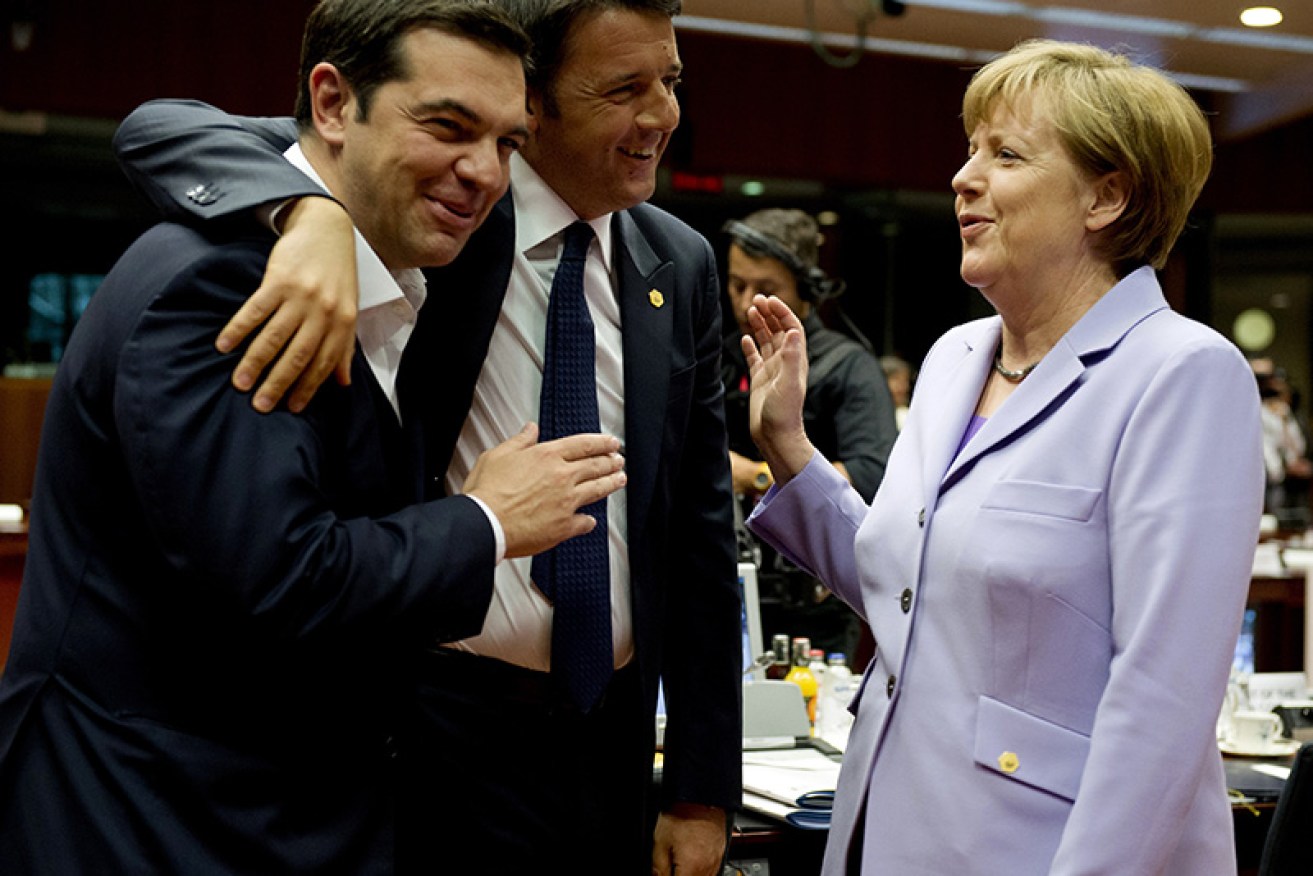Debt is a Europe-wide crisis, not just a problem for the Greeks

Getty
In 1940, Benito Mussolini’s envoy to Athens asked then-prime minister of Greece Ioannis Metaxas whether Italian troops could march freely across the northern border to extend Il Duce’s fascist empire.
Metaxas’ reply – “Oxi” (“No”) – has since been commemorated each year on October 28 as a Greek national holiday.
The rejection of Mussolini’s offer exposed Greece to the harsh misery of World War Two, but it said a lot about how the Greeks viewed their sovereignty.
• Why your superannuation is at Pudong’s mercy
• Rock-star finance minister resigns in Greece
• Greece plan needed by Thursday
The Greeks said “Oxi” again at the weekend to austerity measures recommended by the European creditors and the International Monetary Fund.
Greeks know that the outcome of the referendum won’t shield them from economic misery for many years, but they wanted to make a point to Europe’s leaders.
The big lesson for Angela Merkel and her finance minister Wolfgang Schauble is that Alexis Tsipras and his government have an authority to negotiate a new bailout deal on behalf of the Greek people.
Yes, the Syriza government is a left-wing government that Merkel and other European leaders are unaccustomed to dealing with – but Berlin has been shown it has no say in who rules Greece.
That was the point of Sunday’s referendum.
No illusions

Greece said ‘no’. But what now?
The Greeks are not deluded about the reality that awaits them.
It’s an awful one.
Many who voted “No” in the referendum on Sunday are also concerned that the Syriza government lacks the wherewithal to execute economic reforms to put the nation on track for long-term recovery.
Ultimately, the problems that lie at the heart of Greece’s mess – rampant tax avoidance, political graft, nepotism and corruption – rest at the feet of the Greeks and their past governments.
If Greece can confront this truth, its government might also come to terms with what their frustrated European creditors have had to put up with for so many years.
Wikileaks lifts the lid on 2012 debt bailout
Greece’s creditors should also recognise that they prodded the Greek government in 2012 into signing a debt bailout package knowing that it would not be able to meet its repayment obligations.
US intelligence documents released through Wikileaks in the last week show that Mrs Merkel knew in 2011 that the Greek government was signing a deal that it could not comply with.

Former Greek finance minister Yanis Varoufakis fell on his sword.
According to a leaked US national security document – based on telephone intercepts by US intelligence agencies – German finance minister Schauble was urging Mrs Merkel to write off part of Greece’s debt before a €130 billion debt bailout extension was ratified in February 2012.
Mrs Merkel and the French government rejected Mr Schauble’s effort to make the terms of the first Greek bailout more achievable.
The Wikileaks documents suggest that Greece’s European partners displayed some of the traits commonly associated with predatory lenders in asking the Greeks to sign up to austerity measures that subsequently stifled economic growth.
This constitutes a breach of trust that might match Greece’s longstanding failure to meet its obligations to international lenders.
Many Western commentators have cast the tortuous bailout saga as a problem rooted in the lack of faith that European leaders have in the Tsipras government.
The bottom line is that both sides have let each other down.
Italy, Portugal, Spain not far behind
Greece needs to stay in the European Union for reasons of national security, not economic dependence.
The single currency has been a disaster for the country and other southern European nations such as Portugal and Spain that are all now burdened with loan obligations that cannot be repaid.
The effect of the Euro has been to strengthen the trading position of robust northern European economies at the expense of peripheral partners.
This is a fundamental issue that domestic electoral imperatives in Germany prevent Mrs Merkel from recognising publicly.
| Country | Total Debt | Percentage of GDP |
| Italy | €2.7 trillion | 140.9% |
| Spain | €1.1 trillion | 86.3 % |
| Greece | €320 billion | 172% |
| Portugal | €229 billion | 133.3% |
If Mr Tsipras wants Greece to remain a member of the European Union, he should give some thought to how any deal is likely to play out politically in Germany because Mrs Merkel’s ability to loosen austerity or reschedule debt depends on the likely reaction of her voters.
That requires statesmanship, a quality that Mr Tsipras is yet to demonstrate.
It also requires a respect for the sovereignty of other nations, a principle that German leaders have some difficulty understanding.
D-Day – July 20

If a deal isn’t struck by July 20, the Greek economy could implode. Photo: Getty
If there is no deal in the next 10 days, Greece’s financial system will implode and the lives of ordinary Greeks could turn macabre very quickly.
Another debt repayment – €3.5 billion owing to the European Central Bank – has to be completed by July 20.
A default would trigger the collapse of Greece’s commercial banks and force separation of the Hellenic Republic from the developed world.
Under this scenario, Greece’s creditors will lose more than €320 billion on loans made to the Greek government.
It would likely put the spotlight on other debt-laden EU members, including Italy’s mind-numbing and seemingly insurmountable national debt of €2.7 trillion.
An exit would also cloud Greece’s position in geo-political affairs and its future in the NATO Alliance.
This, of course, raises another question: is Washington preparing to intervene to keep Europe intact and Greece a Putin-free zone?








